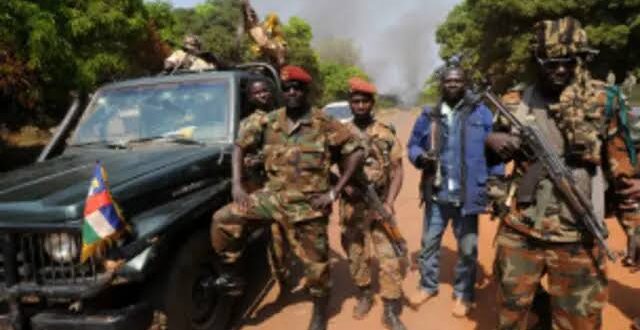MuhamadYehia
BANGUI, Central African Republic (AP) — Hours after Russian mercenary leader Yevgeny Prigozhin rebelled against his country’s top military leaders, his private army’s biggest client in Africa panicked, turning for help to his foe in the West.
Officials from Central African Republic, where some 1,500 of Prigozhin’s shadowy Wagner Group mercenaries were stationed, wrote a letter that day, requesting to “rapidly” arrange a meeting with a private U.S. security firm to discuss collaboration.
Dated June 23, 2023, the day Prigozhin launched the armed rebellion, the letter sparked a series of private meetings, culminating in a deal with the central African nation and Bancroft Global Development. That sparked backlash from Russian mercenaries, according to a dozen diplomats, locals, and analysts.
The tensions in Central African Republic are a window into a larger battle playing out across the continent as Moscow and Washington vie for influence
The Russian mercenaries — using success in staving off rebels in this impoverished nation as a model for expansion — have long been accused by locals and rights groups of stripping natural resources such as minerals and timber and are linked to the torture and death of civilians. In the wake of Prigozhin’s rebellion and suspicious death in a plane crash, the Russians are recalibrating their Africa operations. The United States, which has been largely disengaged from the region for years, is attempting to maintain a presence and stymie Russian gains as it pushes African countries to distance themselves from the mercenaries
U.S. officials blame Russia for anti-American sentiment in the region and say they’re trying to shift the narrative
“If the U.S. can’t regain a foothold, it could give Russia greater economic and political leverage,” said Samuel Ramani of the Royal United Services Institute, a defense and security think tank. “If Russia loses Central African Republic, its flagship model on the continent, there could be a domino effect in other countries.
Russia’s influence
In recent years, Russia has emerged as the security partner of choice for a growing number of governments in the region, displacing traditional allies such as France and the U.S.
Moscow aggressively expanded its by using mercenaries like Wagner, who have operated in at least half a dozen countries since around 2017. They’re tasked with protecting African leaders and in some cases helping fight rebels and extremists.
They’re also plagued by their human rights record. Two years ago in Mali, Wagner and the army were accused of executing about 300 men — some suspected of being Islamist extremists, but most civilians — in what Human Rights Watch called the worst single atrocity reported in the country’s decade-long armed conflict. And in Central African Republic, mercenaries train the army on torture tactics, including how to cut hands, remove nails, throw fuel and burn people alive, according to watchdog The Sentry.
A soldier who spoke on condition of anonymity for fear of reprisal confirmed torture tactics and told The Associated Press he saw mercenaries put a fellow soldier into a sweltering container as punishment. He said people could stay locked in containers for three weeks, with many dying inside
Central African Republic was one of the first places the mercenaries entered. The country has been in conflict since 2013, when predominantly Muslim rebels seized power and forced the president from office. Six of the 14 armed groups that signed a 2019 peace deal later left the agreement. Locals and the government credited Wagner with fighting back rebels who tried to overtake Bangui, the capital, in 2021. The Russians soon expanded to Burkina Faso and Niger, and have ambitions for further growth.
 موقع وجه أفريقيا موقع وجه أفريقيا هو موقع مهتم بمتابعة التطورات في القارة الأفريقية
موقع وجه أفريقيا موقع وجه أفريقيا هو موقع مهتم بمتابعة التطورات في القارة الأفريقية



